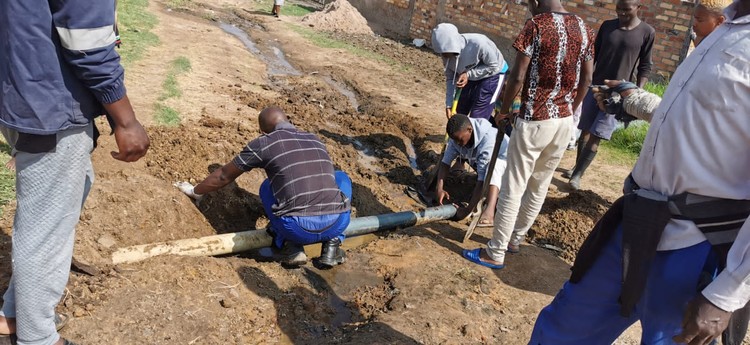
19 February 2024
Carolina residents trying to fix a broken sewage pipe in 2021. Photo: Supplied
Every two weeks, Makhaza Ntuli borrows his brother’s bakkie so he can load containers to fetch clean drinking water from a church’s borehole three kilometres from his house in Carolina, Mpumalanga.
Ntuli lives with his elderly mother and teenage son. They do not use the discoloured municipal water that comes out the tap for drinking or cooking, reserving it for laundry and bathing only.
“We don’t have clean water, therefore, we have to survive on water that we ask from the churches which are situated far away from us,” says Ntuli, who is a community leader in Carolina’s Silobela township.
But the other approximately 3,500 households in Carolina share the same problem.
“Sometimes when we find that there are a lot of people queuing for water at the churches then we buy water. It costs about R15 for 20 litres and I normally buy about 140 litres.” He says this volume lasts for two weeks as they only use it for cooking and drinking.
But he says using the tap water for bathing is also a problem. He has developed an itching rash, which the pharmacist told him was caused by the contaminated municipal water.
“The rash goes and comes back again. I’m not the only one suffering from this kind of a rash in the area.”
He said when he asked the municipality about the causes of contamination in the water, he was told it is caused by sewage spillages which flowed into the rivers and dams.
In September last year, the Water Community Action Network (WaterCAN), an environmental lobby group, together with Carolina Eco Green Economy, conducted a water test. This showed that tap water in Silobela was contaminated with Escherichia coli (E. coli) which is a faecal bacteria which can cause diarrhoea, vomiting and stomach cramps.
Dr Ferrial Adam, executive manager at WaterCAN, said an inspection of the streams and dams around Carolina found that they were contaminated with sewage, plastic, and animal carcasses.
“We are urging people not to drink the water until we redo the tests soon. If we find the same results, the municipality will have to inform the community that they must boil the water before consuming or using it to avoid contracting diseases,” said Adam.
WaterCAN’s test had showed contamination of the Boesmanspruit Dams, which is the town’s water source, and water sampled from several taps in Ndebele Street in Silobela tested positive for E.coli.
The results showed that “it is unsafe to drink or use the water from some parts of Carolina,” said Adam.
Resident Edward Zitha, who is also a member of the non-profit Carolina Eco Green Economy, said they have tried in vain to compel the municipality to provide clean water.
In 2012 the Federation for Sustainable Environment and Silobela Concerned Community took the Albert Luthuli Municipality - which governs Carolina - to the North Gauteng High Court to compel it to provide clean drinking water.
Despite Judge Moses Mavundla finding in their favour and ordering the municipality to supply clean drinking water, 14 years later nothing has changed.
The Department of Water and Sanitation’s Integrated Regulatory Information System (IRIS) to which municipalities are mandated to load the results of regular water quality tests, shows the Chief Albert Luthuli Local Municipality, is failing to provide clean drinking water.
One of six measures of water quality is how much faecal bacteria it contains. The South African National Standard (SANS) is for zero E.coli in drinking water, but in 2023, the Carolina supply system complied with this standard just 29% of the time.
The 2023 Blue Drop score for Carolina’s drinking water supply system was 21.2%, and in the “High-Risk” category.
The report stated the water treatment plant in Carolina was operational but needed some improvements. “The potable water is not microbiologically compliant and poses a serious acute health risk to the community,” states the report.
The water crisis in Carolina is also affecting small businesses.
A local catering company owner, who preferred to remain anonymous due to fear of reprisal from the authorities, said the lack of clean drinking water forced her to cut down on clients.
“In the catering industry we use more water to cook, so due to this water problem I had to buy water when offering my service.”
The cost of having to buy water to cater at large events such as funeral services, weddings and other celebrations, significantly cuts into her profits, she said.
“My business is struggling to survive because of this water problem. The water is brown and sometimes is black.”
Chief Albert Luthuli Local Municipality spokesperson Thapelo Phetla has not yet responded to the questions sent on 6 February to him via WhatsApp.
Department of Water and Sanitation spokesperson Wisane Mavasa was asked for a comment on WaterCAN’s results, but no response has been received.